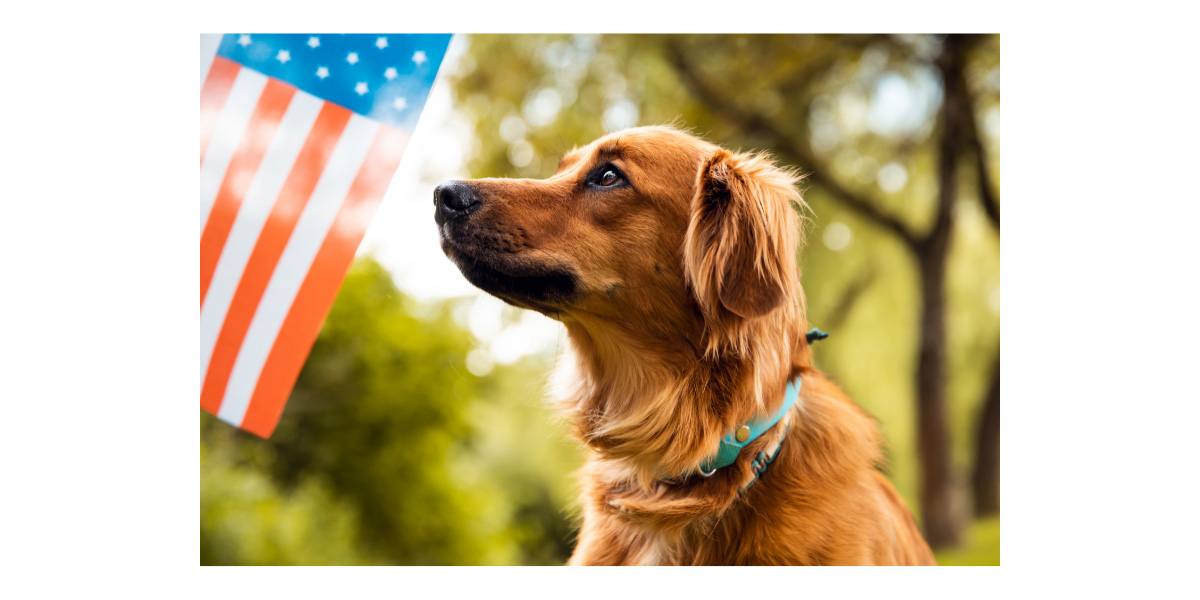
The Fourth of July is right around the corner, and, not-so-coincidentally, it’s also Lost Pet Prevention Month. The day after the Fourth of July is the #1 busiest day of the year for animal shelters. Frightened by the booms, bright lights, and crowds, many pets go missing when they try to run for cover. Keep your pet safe this holiday with our top five July 4th safety tips.
Give Treats, Not Table Scraps
Veterinarians always see an increase in cases of gastric complications around holidays, when pets get into festive foods or are overindulged by guests. While your pets may obsess over the barbecue, hamburgers and hot dogs are not pet-friendly fare. They’re usually high in fat, which can cause a health-threatening case of acute pancreatitis in dogs. These foods are also high in sodium and can contain ingredients that are toxic to pets, like onions and garlic.
Instead, stock up on pet treats in festive flavors so your cat or dog can celebrate in their own way. Try Disney Table Scraps Hot Diggity Dog Treats instead of hot dogs, or Churu Chicken Puree instead of grilled wings.
Keep Pets Away From Fireworks
Sparklers, roman candles, poppers, and other at-home pyrotechnics are a hazard to pets if they’re left within reach. A curious pet could chew, ingest, or even set off an explosive device.
When the fireworks and other special effects are in use, double-check that all pets are safe inside. Some pets will panic and try to attack the source of the noise, rather than run away.
Keep in mind that a cat or dog’s hearing is considerably more advanced and more sensitive than ours. Booms and bangs can be incredibly painful and scary to our pets. They have no place at fireworks shows, and celebrations around your neighborhood can still be loud enough to cause a panic.
Prepare for Noise Anxiety
Whether it’s your pet’s first 4th or their twenty-first, there’s a possibility that they will experience extreme noise anxiety when the fireworks go off. Senior pets can sometimes experience worsening sensitivity to loud noises as they get older, so even if your pet once didn’t mind the booms, this year could be different.
Make sure your pet has a safe, quiet place to settle down by the time it starts to get dark. You can muffle outside sounds by putting on a not-so-dramatic movie or TV show, some calming music, or a white noise soundtrack. Some pet parents see improvement when they put a tightly-fitting hat, called a “snood,” over their dog’s ears, but if your dog is not used to wearing one, they might just find it more stressful.
Your vet can prescribe an anxiety medication to give on an as-needed basis. They’re likely to be inundated with calls for the same the week before the holiday, so make sure to get yours prescribed and filled in advance.
Over-the-counter options usually contain a blend of ingredients like melatonin, tryptophan, hemp, chamomile, and valerian root, all of which can take the edge off your pet’s anxiety so they can sleep through the celebrations.
Update Collar Tags and Microchips
In the event that your pet does go missing, you’ll greatly increase your chances of getting them back home if they have a collar tag and/or microchip that’s up-to-date with your contact information. Next time you see your vet, ask to have your pet’s chip scanned to make sure it’s still in place, and that your pet’s registration number is connected to your current phone number and address.
Protect Pets from Summer Heat
July is the hottest month of the year in most regions in the United States, so you can expect sky-high temperatures by Independence Day. If your pet will be present for daytime activities like park trips, kayaking, camping, or barbecuing, minimize their risks of heat stroke, dehydration, and sunburns by making sure they always have access to shade and cool water.
















































